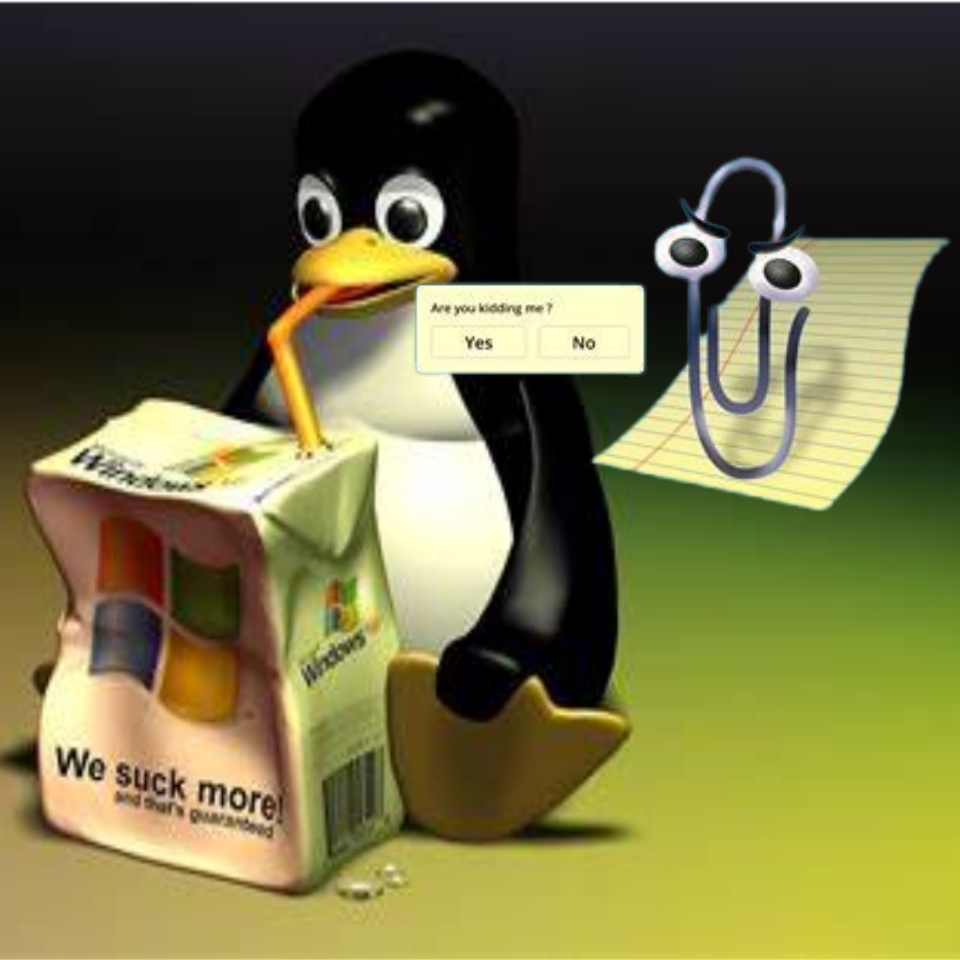Don’t downgrade to Windows 11, update to Linux
Have Win 10 and was a Windows die hard since I was a kid.
Been running Linux on another drive as my default boot for a year and a half in anticipation of this horseshit and was only hesitant to delete Win because my Fanatec sim racing hardware wasn’t supported on Linux.
Welp, turns out hid-fanatecff is a thing. Installed the kernel driver and boom, working Fanatec peripherals. Even my Moza shifter is plug-and-play.
Bye bye Microsoft.
Is there any use for a HP Reverb G2 on linux?
Fully supported by Monado looks like.
Idk how recent that Monado support is, but I couldn’t get the reverb G2 to work on Linux at all a couple years ago.
A couple years IRL is like 100 years in Linux time
Yeah, peripherals lol. All my sim stuff is working brilliantly in Linux, however I still have some audio production stuff I need Windows for. Unfortunately, due to the need for minimal hardware latency and all that, Wine and VMs aren’t an option. Also a lack of drivers for some midi devices sucks.
Really? I run my home studio in Nobara Linux without any latency issues. I use Reaper as my DAW. Are you using
yabridge?Yeah I have tried it, but didn’t have luck unless I was driverless and that meant losing velocity. Maybe I configured wrong, it was kind of confusing but the internet said it was facing the same issues as me. Mainly this was for Roland stuff.
I was going to just get a laptop for Windows to record onto next to instruments and then transfer, but I’d rather just be able to plug into the DAW.
That’s really strange. I have an M-Audio 60ish key and a smaller Novation Nocturn MIDI keyboard as well as a Roland electric drum kit and have no issues doing anything over MIDI with them on Linux.
Maybe its worth another try? I don’t need drivers for any of that stuff.
Huh, weird.
Okay, I’m definitely trying again.
Some of my older gear is fine, but an example of something that wasn’t working was my TD-27 V2 on a kit. What module is on yours?
Wine can actually beat native in latency, since it’s a pretty thin translation layer and windows is … windows.
I’d give it a shot just in case.
The logic behind the voice controls sounds pretty questionable, but it’s supposedly backed by data showing that users spend billions of minutes talking in Microsoft Team meetings, according to Mehdi — so they’re already used to talking on the computer, right?
Do they really reason like this? Oh my. That’s stupid. And here I was thinking Microsoft employs clever people.
Ok, guys. I’m reading some of these replies which are saying the amount of outrage is out of proportion. I have to disagree with that. I don’t want an AI running on my PC that is monitoring and learning about my shit. I didn’t want that data saved even locally, let alone the monetization of that data. I don’t want to be paying for power of a device that is turning me into someone else’s paycheck.
Can you turn it off? I believe you can. But I also believe that doing it manually would be incredibly annoying since that does go with a lot of past practice. I also get it would reactivate itself after major updates, like how Edge keeps reinstalling.
Are there other solutions to my Microsoft issues, yes. Chris Titus Tech comes to mind.
But overall, the Windows ecosystem does not feel right to me anymore. Could other people still use it, yes. Am I going to stop them, not intentionally. But my Arch gaming PC runs games better than the same machine running Windows. I’ve always entertained the idea of a full switch, still have a Windows 11 dual boot and haven’t officially done it yet, but with this the moment feels right. At least for me, hopefully you can understand that.
I had dual boot with win10 for a while, but when they had that ‘bug’ that was wiping peoples linux partition I dropped Windows completely. As dar as I’m concerned Linux and other FOSS in general has reached a point where it meets the majority of my needs. Same goes for local storage vs needing anything through the cloud or streeaming.
Every hang up I had eventually got solved. Except with modding games, I sorely miss Vortex or Mod Organizer and there’s no alternatives I know of besides doing it all manually.
That wasn’t a showstopper for me though. VR, HDR, Video Games were. These three are solved well enough for my tastes this year to drop my dual boot.
Fortunately on the modding front, the community’s already been cooking:
I‘m using it for Stardew Valley and it works pretty well. Still early days and a bit clunky to use though. Not any power user features to speak of but I guess that isn’t their target userbase for a mod manager.
Vortex works on linux though, This is the guide I used.
Is it just Bethesda games with these post-deploy scripts? I assume this:
https://github.com/pikdum/steam-deck/
Is forcing the Windows version to work somehow, but is it every game on Nexus or just Bethesda titles?
I have no idea, I only tested it with skyrim, and it worked well.
Nexus Mod Manager is working fine under Linux. It’s still under development, but i’ve been modding Cyberpunk 2077 to hell and back with it.
You’re stretching it to say that when the Linux version has extremely limited game support.
It’s literally just CP2077 and Stardew Valley.
https://nexus-mods.github.io/NexusMods.App/users/games/
Researching more, I found LIMO:
https://github.com/limo-app/limo
And some more ideas here:
Hopefully LIMO works because the other ideas look like a brittle PITA.
well, next up is bethesda games support, and development of the app is pretty fast, so i would expect a release supporting skyrim this year. You’re right that it’s pretty barebones now, but i wanted to say that we linux users will finally have a mod manager on par with the windows side of things, which is pretty awesome!
I think we have a bit of a degree of “Yep, that’s Microsoft alright” mood as a whole because it’s accepted that things are going to get worse for their users perpetually, so I personally stopped giving a shit because I already left before win10 EOL anyway. I’m guessing there’s a similar mood among others who already saw the writing on the wall.
Do yrself the favor and cut the cord.
The cool part is that 100% of the “AI features” they’re advertising are either not running locally or not AI at all
If you don’t need to do 3D work, you can still use a virtual machine with kvm, it is really fast! (then ditch Windows :) )
If you mean CAD, I found that FreeCAD works nicely as a parametric 3D modeler with some nice macros and addons, with the perk of also running on Linux
E: added info
I’m not too into 3d modelling stuff myself, but I understand Blender is pretty good, too.
I’d agree that blender is very good. I find that it would be more suited to static stuff and renderings, as well as animations. FreeCAD is more like the commercial CAD software you’d find (Fusion 360, Solidworks).
On the topic of blender, It has some amazing features, and I am amazed at what people do with it (I also find it a bit tricky, but I probably just need to put a few more hours into learning)
Yeah, to clarify I didn’t mean Blender as an alternative but that there are decent options for another kind of 3d work in addition to CAD stuff. FreeCAD for design stuff, Blender for making pretty things (or ugly things if that’s what you’re into), Vulkan/gcc for real time 3d stuff if you like working close to the metal, Godot for real time 3d stuff if you want to do it from a higher level.
It’s off by default.
Edge keeps reinstalling because it powers lots of other things in the OS. Removing it breaks other things, which is why so many people on here think that Windows 11 is “broken” or “buggy” - they run random “debloat” programs and completely fuck up their OS.
For now.
Also fuck edge for so many reasons, like ring zero access. It’s "used by (not “powers”) other things in the os by design so that they "can’t " comply with EU rules(and more).
What is this AI everywhere concept actually supposed to accomplish for the end user? Maybe I’m just behind on the vision but I can’t grasp the point. I have a feeling it’s not really about what the users want but I’d love to here a genuinely good use case.
I work in IT and far be it for me to tell you what OS to use on your own computer.
The only thing I want to die right now, is the AI bubble. Just pop already. Holy fuck what a worthless endeavor this has been.
+1000. one of my coworkers keeps thinking he’s saving time with AI-generated code but what he’s really doing is pushing the thinking downstream when we have to pick apart the absolute garbage that gets generated.
PR feedback gets turned into AI prompts and the cycle continues. It’s exhausting
Yeah, it’s BS. I scrutinize PRs to let peers realize that it’s often not worth the time when they have to redo basically everything the agent wrote in the first place. There’s been some truly lazy PRs…
I moved to pop!_os on the 14th and I am not looking back
Can anyone give recommendations on what to do if you have to run Autodesk products (Revit. Autocad) for work? No, I can’t swap them for open source alternatives such as FreeCAD as Im working with large international projects. Should I dual boot? Virtual machine inside Linux?
yay! hi mint!
yeah, I updated one machine that was running Win10, it’s now running LinuxMint
It’s insane how much extra time, effort and sanity you can retain simply by switching to Linux. I initially switched a few years ago, then fully shortly after. Using my PCs has never been better and I had no issues with gaming. The only games that don’t work are some of the live service ones I’ll never be interested in.
One of the best decisions in my life, right up there with deleting all social media. Life keeps getting better, relatively speaking, but of course rich pedophiles just can’t tolerate us having a good time.
Switched everything to Bazzite as a start. Easiest switch after figuring out Windows sabotages boot drives.
I may have pirated all my Windows but man it feels good to be off that ride. Spoofing corporate licenses for the authenticator was such a hassle.
They do what to boot drives?
If you’re dual booting, Windows may at any time eat the other partition or, more often just its GRUB, leaving you unable to boot into Linux.
Even if you’re using separate drives, the Windows bootloader may still affect your other drives. On one of my old laptops, I had Pop!_OS and Windows on two separate SSDs. After installing Windows on the second drive, it put itself as the first boot device and broke the option to change boot order inside the BIOS. It worked, but only sometimes, and Windows would keep setting itself to the top upon every boot. Might not have been intrinsically a Windows issue, but never happened with other configurations.
I’m trying to move to Linux so that’s terrifying.
Windows can automount USB drives, so a flash drive can get inadvertently formatted, (or something to do with the bootloader, i don’t know the technical details that well.) Point is the automounting can break a flash drive that isn’t formatted for windows.
Linux is the only viable solution to this mess. And no it is not as scary as it seema
Four Horsemen of Apocalypse
- The country where a lot of tech countries are headquartered in, elects a wanna-be dictator
- Android restricts “sideloading” (aka: non-approved install)
- Windows has mandatory AI
- Mandatory ID Verification
How do I escape this shitty timeline?
Stop SERN, Prevent WW3, Find the Steins;Gate Seikaisen (Worldline)
El. Psy. Congroo.
Just ask ChatGPT…
I hate this world. Linux it is then.
Microsoft literally wanted me to convert my desktop to e-waste as it lacks the magical TPM chip that Win11 demands.
I said “fuck that” and pulled the Boot SSD, kept the existing non-boot drives for data, and put in a brand new SSD, encrypted it and installed Pop OS in one shot.
Not only was it easy, I lost literally zero critical functionality vs. what I had with Win 10. There is a Linux app equivalent for everything I had before. I had a few driver issues but most were auto-discovered including obscure ancient printers and scanners on my network.
it lacks the magical TPM chip that Win11 demands.
How old is it? TPM 2.0 has been standard equipment for nearly ten years now. It’s disabled by default on some systems.
Intel Core 8th gen and above, and Ryzen 2000 series and above, should all have TPM 2.0 built into the CPU (fTPM)
Does it really matter? I’ve been using my i7 from 2016 and it’s still going strong.
Depends on if you use any security features that require a TPM. If not, the older chips are fine, or some motherboards allow a separate TPM chip to be added.
For example, my employer requires TPM 2.0 for both Windows and Linux systems, since they store most encryption keys and certificates on it - including WPA2-Enterprise key for wifi, 802.1x key for wired Ethernet, SSH keys (in some cases), LUKS key for full-disk encryption on Linux, Bitlocker key on Windows, etc.
For home use, if you don’t use any of those features (or require strong encryption for them), the main thing you’ll miss out on is support for Windows 11, which is fine if you’re using Linux.
In a way, I see the lack of windows support as a positive.
Sure, but there’s Linux features that use TPM too, although you probably don’t need them in a home environment.
Why did you have to replace the SSD?
In case they had to roll back, and so they can pull data
I didn’t “have to” but, a few reasons…
-
Swapping the drive created a pretty easy rollback path that was just “put original drive back”
-
The drive was ~10 years old, and was in the range of recommended replacement for an SSD with the amount of TBW and age it had.
-
Original drive was kinda small and a new larger drive was available for not very much money.
-
Arguably sometimes drivers for older devices are more likely to have been ported to Linux at some point then conpletely new devices.
It’s not TPM. Older Intel CPU’s have unpatchable hardware flaws.















